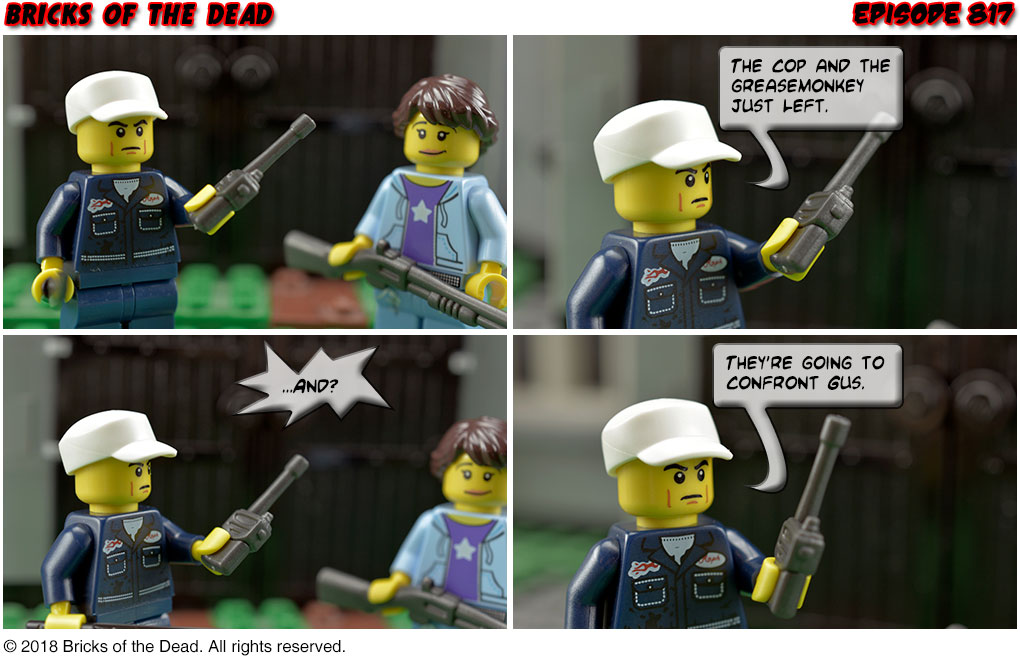Zombie Cliche Lookout: Reveals
Once again, today’s cliche isn’t specific to the zombie genre. Rather, it’s a staple of narrative fiction in general. I’m talking, of course, of the point-of-view pivot to give readers some insight on what the other group is actually up to. Generally speaking, there’s a fair bit of preamble leading up to this. Hints are dropped, and the audience is given some time to get to know the characters and situations, weigh the evidence, and start coming up with theories of their own.
About this Episode:
I’ve done dialog from radios and televisions before, but I don’t think I’ve ever been terribly consistent about it. I believe – and I’m sure you’ll correct me here – that I’ve done two versions to differentiate it from standard dialog: a square balloon, and this sort of crazy polygon pattern. Honestly, I wouldn’t be surprised if I’d used regular dialog balloons for these as well. In retrospect, I should have written out a very thorough style guide for the comic before I ever started. Ah well, I guess I can cover that with Bricks of the Dead: The Director’s Cut in ten years or so.
And on a totally unrelated note, it took me damn near twenty minutes to find that radio piece. Much like my dialog balloons, I’ve gone through a few different sorting and organization methods over the years, and the radio was not where it “should” be.
Discussion Question: External Dialog
Building on the About this Episode, what do you guys think works best for showing dialog external to the characters on (or just off) screen. In this case, let’s stick to things being transmitted through TVs, radios, computers, etc. Someone yelling at a distance should probably have a different style more consistent with standard dialog. Right? Right.

It might not be a typo but “sorting and organization methods of the years” could be written with “over” instead of “of” in it. Dave’s choice. 😀
That should definitely be “over”. Fixed.
Regarding the different types of dialog balloons the simplest answer would mostly be to use them where they fit the best. Let’s say it’s a computer screen, and you’re seeing messages from the other party on it. That’s an obvious one, just display it right on the screen. Oh, wait, it’s facing away from the audience? Little square close-up of what’s on the screen with two bars attaching it to the monitor it’s coming from.
Tv’s and radios often get static noise or hiss in them, maybe a little hissing and howling would indicate a radio conversation, especially if you want to be cryptic about it and insert 3-4 periods to denote words or parts of sentences that are missing or not received. 😀
It really depends on what you want portrayed. Write the story to be portrayed, the dialog to be portrayed, and what it’ll be portrayed on, and then add noise or balloon FX as appropriate! 😀
I like the idea of breaking up the radio dialog a bit. Very nice call that I wish I would have thought of.
Discussion question: “greasemonkey” – put yourself in Russell’s shoes for a minute. Let’s say you weren’t quite out of earshot of this group, and faintly heard that reference to your profession they think you are skilled in. How do you react, if at all? Do you just ignore it or do you start thinking why they’re calling you that? Is it a term generally considered derogatory or complimentary to one skilled in the mechanics of motor vehicles and small petrol-driven motorized equipment?
Very good point. I would say it all comes down to who is saying it. You can call someone a greasemonkey as a compliment or as a pejorative very easily. How they take it, regardless of your intent, is another matter altogether.
Where are all the other commenters? it’s like they’re on Easter Vacation or something! 😀
I don’t know if this means much to Dave, but I think it was a mistake to announce the eventual end of BotD! 😀
Hah, yeah you’re probably right about that.
I’ve been buuuuuuussssyyyyyyy xD
Also, I tend to read the comic a few weeks at a time, although it is nice to know that my witty banter has been missed 🙂
While it is sad that BotD is dying (pun so intended) all good things must come to an end. Its better to end it on a high note when people still want more, as opposed to letting it carry on until it reaches that point when people say “Finally!” when it ends. 🙂